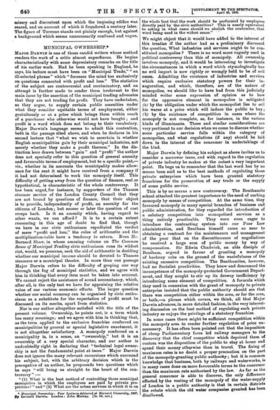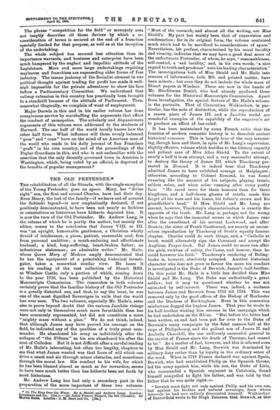MUNICIPAL OWNERSHIP.*
MAJOR DARWIN is one of those candid writers whose method renders the work of a critic almost superfluous. He begins characteristically with some depreciatory remarks on the title of his earlier work. Had he been speaking in England, he says, his lecture must have been on "Municipal Trade," "an ill-selected phrase" which "focusses the mind too exclusively on questions connected with profit and loss." The statistics of the subject are controversial and recriminatory, and an attempt is further made to render them irrelevant to the main issue by the assertion of the municipal trading advocates that they are not trading for profit. They have undertaken, so they argue, to supply certain public amenities under what they consider equitable terms of employment, either gratuitously or at a price which brings them within reach of a purchaser who otherwise would not have bought ; and profit is a word which does not belong to their vocabulary. Major Darwin's language seems to admit this contention, both in the passage cited above, and when he declares in his second lecture that "what we wish to ascertain is whether English municipalities gain by their municipal industries, not merely whether they make a profit thereon." In the dis- tinction here drawn between "gain" and "profit" the author does not specially refer to this question of general amenity and favourable terms of employment, but to a specific point,— viz., whether in its accounts the municipality makes allow- ance for the rent it might have received from a company if it had not determined to work the monopoly itself. This difficulty of getting away from the question of finance, real or hypothetical, is characteristic of the whole controversy. It has been urged, for instance, by supporters of the Thames steamer service of the London County Council that they are not bound by questions of finance, that their object is to provide, independently of profit, an amenity for the citizens of London ; but sooner or later the question of cost creeps back. Is it an amenity which, having regard to other wants, we can afford ? It is to a certain extent reassuring in this age of doubt to find that, though we have in our civic enthusiasm repudiated the verdict of mere "profit and loss," the rules of arithmetic and the multiplication-table have a tendency to return. Even Mi.. Bernard Shaw, in whose amusing volume on The Common Sense of Municipal Trading civic enthusiasm runs its wildest riot, would, we presume, seek the aid of arithmetic in deciding whether our municipal income should be devoted to Thames steamers or a municipal theatre. In more than one passage Major Darwin refers to the difficulty of groping our way through the fog of municipal statistics, and we agree with him in thinking that every item must be taken into account. We cannot reject the assistance of sound accountancy, which,
after all, is the only test we have for appraising the relative value of our various economic efforts. The larger question whether our social economy can be organised by civic enthu- siasm as a substitute for the expectation of profit must be discussed on its merits, apart from statistics.
Nor is our author altogether satisfied with the title of the
present volume. Ownership, he points out, is a term which has many meanings; and we agree with him in thinking that, as the term applied to the exclusive franchise conferred on municipalities by general or special legislative enactment, it is not altogether satisfactory. A monopoly conferred on a municipality is, in a sense, an "ownership," but it is an ownership of a very special character, and our author is undoubtedly right in declaring that "technical legal owner- ship is not the fundamental point at issue." Major Darwin does not ignore the many relevant excursions which surround his subject, but, with the arbitrary decision which is the prerogative of an author, he propounds two questions which he says "will bring us straight to the heart of the con- troversy" :— "(1) What is the best method of controlling those municipal monopolies in which the employees are paid by private pro- prietors " and" (2) What are the urban services in which it is on it Municipal Ownership: Pour Lectures delivered at Harvard University, 1907. 113y Leonard Darwin. London John Murray. [28. 64. net]
the whole best that the work should be performed by employees directly paid by the civic authorities? This is nearly equivalent to asking in what cases should we abolish the contractor, that word being used in the widest sense." '
We might object that it would have added to the interest of this treatise if the author had as a preliminary discussed the question, What industries and services ought to be con- stituted monopolies ? There is no word more vaguely used in political controversy than this of monopoly. All ownership
involves monopoly, and it would be interesting to investigate the circumstances in which a word which etymologically has no evil import is now rightly or wrongly held to be of evil omen. Admitting the existence of industries and services which require exclusive statutory powers for their in- auguration, and which, therefore, are of the nature of
monopolies, we should like to have had from this judicially minded writer some expression of opinion as to how far the oppressive element in monopolies is mitigated
(a) by the obligation under which the monopolist lies to sell his wares at a price which will induce the public to buy ;
(b) by the existence of competition in cases where the monopoly is not complete, as, for instance, in the various kinds of illuminants. These and similar considerations are very pertinent to our decision when we come to discuss whether some particular service falls within the category of monopolies, and what regulations (if any) should be laid down in the interest of the consumer in undertakings of the kind.
Major Darwin by defining his subject as above invites us to consider a narrower issue, and with regard to the regulation of private industry he makes at the outset a very important point. He begs us to remember that the last word has by no means been said as to the best methods of regulating those private enterprises which have been granted statutory franchises for the prosecution of any trade or the supply of some public service.
This is by no means a new controversy. The Benthamite school attached the greatest importance to the need of curbing monopoly by means of competition. At the same time, they favoured monopoly in many special branches of business and public administration, for they regarded the introduction of a salutary competition into monopolised services as a thing entirely practicable. They were even eager to introduce the contracting system into our Poor Law administration, and Bentham himself came so near to obtaining a contract for the maintenance and management of the poor that on the discontinuance of negotiations he received a large sum of public money by way of compensation. Sir Edwin Chadwick, an able disciple of Bentham, argued in favour of granting a monopoly of hackney cabs on the ground of the wastefulness of the existing excessive competition. The Benthamites, however, had no Socialist proclivities. They knew and denounced the incompetence of the monopoly-protected Government Depart- ment, and they sought to stir up its drowsy inefficiency by introducing some element of competition. A formula which they used in connexion with the grant of monopoly to private enterprise insisted that the public authority should see that there was competition either within the area, or for the area, or both,—a phrase which covers, we think, all that Major Darwin advances, in more detailed fashion, in the very interest- ing discussion on the best method of regulating such private industry as enjoys the privilege of a statutory franchise.
In some cases there might be sufficient competition within
the monopoly area to render further regulation of price un- necessary. It has often been pointed out that the imposition of cheap Parliamentary fares led railway managers to the discovery that the chief competitor which deprived them of custom was the disposition of the public to stay at home and spend their money otherwise than in travel. The fixing of maximum rates is no doubt a proper precaution on the part of the monopoly-granting public authority ; but it is common knowledge that business, both by railways and waterworks, is
in many cases done on more favourable terms to the consumer than the maximum rate authorised by the law. • As far as the general consumer is able to discover, the only difference effected by the vesting of the monopoly of the water-supply of London in a public authority is that in certain districts the rebate which the old water companies granted has been disallowed. The phrase "competition for the field" or monopoly area not inaptly describes all those devices by which a re- consideration of terms is secured at the end of a franchise specially limited for that purpose, as well as at the inception of the undertaking.
The whole subject has secured less attention than its importance warrants, and business and enterprise have been much hampered by the neglect and impolitic attitude of the Legislature. More and more large undertakings requiring wayleaves and franchises are superseding older forme of free industry. The insane jealousy of the Socialist element in our political thought against trading for profit has made it well- nigh impossible for the private adventurer to show his face before a Parliamentary Committee. We understand that railway extension in this country has practically been brought to a standstill because of the attitude of Parliament. Then, somewhat illogically, we complain of want of employment.
Major Darwin in this and in his earlier volume has done conspicuous service by marshalling the arguments that affect the conduct of monopolies. The scholarly and dispassionate arguments of this volume were addressed to the students of Harvard. The one half of the world hardly knows how the other half lives. What influence will these evenly balanced " pros" and " cons " have on the mind of an American man of the world who reads in his daily journal of San Francisco "graft" in his own country, and of the proceedings of the Poplar Guardians in this, and who is not unfamiliar with the assertion that the only decently governed town in America is Washington, which, being ruled by an official, is deprived of the benefits of popular management?























































 Previous page
Previous page